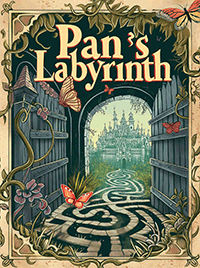What is Shamanic Sorcery?

Sorcery is the practice of manipulating spirit. Sorcery can be used for illusion, for the manipulation of thought and emotion, and the creation of pocket realities. It’s also the way to defend yourself against sorcery, escape the false reality, and in doing so discover truth. Sorcery when used properly is the way of personal power and individual sovereignty, enabling one to escape bondage and come back to one’s true self. A sorcerer’s soul is their own, independent of any god, ideology or group identity.
A shaman is someone who has undergone training and initiation into a set of practices that give them access into the various spirits worlds that exist alongside the physical world. Shamanism is the earliest form of religion, having developed independently in various different cultures all over the world, and still survives today in some indigenous cultures in America, Africa, Europe and Asia.
Sorcery is the deeper more mystical aspect of Shamanism, in the similar manner that Judaism has Kabbalah, and Islam has Sufism. Typically shamans possess a foundational understanding of sorcery. Non-shamans can engage in sorcery but they tend to be unconscious of how it works.
Shamans like to say that shamanism is neither a belief system nor a philosophy, rather it is set of methods for seeing and communicating with spirits and other worlds. It is though a way of seeing life, has initiation rites, offers practices and teachings designed to reveal truth, and includes a cosmology covering what happens after death. By any normal standard it’s a religion. The reason why a shaman does not consider it to be a religion is because for someone who believes it is true it‘s just the practice of truth. (Likewise I once had a Christian tell me that Christianity is not a religion, but a relationship with Jesus.)
Shamanism, and more specifically Shamanic Sorcery, integrates all mystical and magical experiences: energies, spirits, ghosts, shadow people, astral projection, power of will & intention, etc. All of this fits into the Shamanic cosmology.
Some abilities of Sorcery require years of training, but some others can be learned just from reading and then performing the exercise. Those abilities that can be taught instantly are no less magical and world-shattering than those that are developed slowly.
Traditionally, Sorcery has been passed down verbally from teacher to student, but times have changed. Manipulative sorcery has become commonplace and can be used unconsciously. False beliefs blind millions of people. At this point keeping it secret would do more harm than good.
You may or may not believe in spirits or a ‘spirit world’, and you may or may not have direct experience of them. It’s not my job to convince you or to tell you what to believe. Rather, the danger lies in allowing one’s beliefs to dismiss one’s actual experiences. It is a matter of distinguishing between belief and truth. For instance, you may believe that a tree doesn’t exist in your garden, or that it does. However, the tree’s existence is determined by its actual presence, not by your belief in it. If you deny its presence while it is actually there it can be to your detriment.
Philosophies and belief systems are spirits that fight for dominance and for followers. As the saying goes “People don’t have ideas, ideas have people.” What you believe is very important, and to some extent it even looks like belief can change reality. To give the Devil his due: to some extent belief can change reality. However, there is an underlying truth that is evident if you’re willing to look around you and trust your eyes. That gives you knowledge of truth, and from that knowledge of truth comes true power.
Sorcery does give power, and that power can be abused. But power’s only practical use is for discovering and defending the one thing that truly matters: your true self.
Learn more at Sorcery.org

If you enjoyed this article, you’d like my book “Pan’s Labyrinth”.
Pan’s Labyrinth deftly blends fantasy and philosophy, crafting a thought-provoking narrative that lingers in the mind long after the final page is turned. It invites readers to question the nature of reality and explore the profound ideas woven throughout the story. Engaging and intellectually stimulating, this book promises a reading experience that is both entertaining and deeply meaningful.
